City of Champions: A History of Black Achievement in Sports
Discover the athletic legacy of Durham through the city's Black athletes, coaches, programs and establishments.
The legacy of African American sports excellence resonates through the halls of high schools, on college campuses, across baseball diamonds and on film. It transcends the boundaries of any field or court, inspiring generations and shaping the fabric of the community.
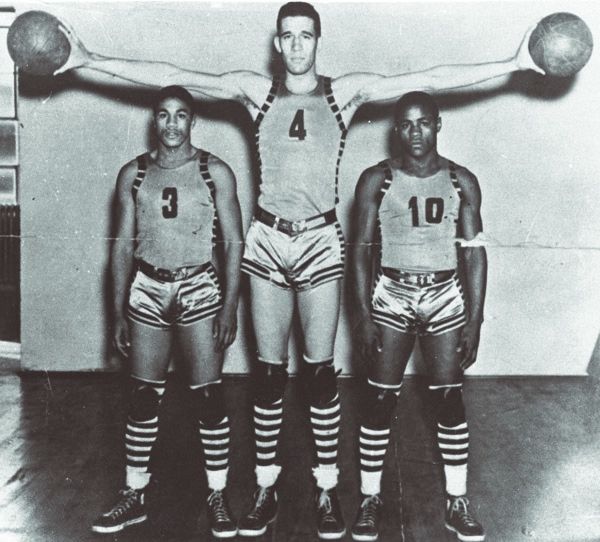
Durham has a formidable athletic legacy, from high school sports to professional athletes. Photo: Durham County Library Historical Photo Collection
High School Athletics
At the high school level, student-athletes have cultivated the tradition of athletic success through dedication, hard work and the guidance of influential coaches. Black high schools in Durham have been a proving ground for future stars, where dreams take shape and aspirations are realized. Hillside High School continues to have a storied athletic program today, building off the legacy of Merrick-Moore High School's success in the 1960s.
North Carolina High School Athletic Conference (NCHSAC)
The NCHSAC served as the athletic organization for historically Black high schools for many years during segregation. Over 100 high schools were members and competed in classified championships in several sports. The NCHSAC was merged into the North Carolina High School Athletic Association in 1968 and disbanded in 1969. Durham’s Merrick-Moore High School and Durham Hillside High School were active members of the NCHSAC, both winning championships in various sports.
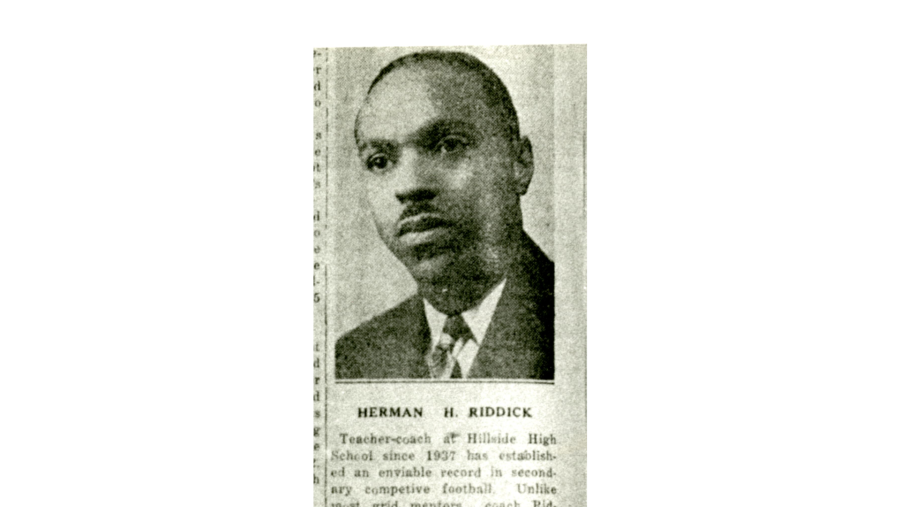
Hillside High's Coach Herman Riddick had an impressive propensity for winning football games. Photo: Durham County Library Historical Photo Collection
Hillside Park
Established in 1962 by the Durham Parks & Recreation Department, Hillside Park was originally located across the street from Hillside Park High School before the school changed locations. The park, an important place for Black families in Durham to enjoy recreational activities, offers picnic shelters, a playground, baseball/softball fields, basketball courts and an outdoor pool. In 2019, FILA North America and the Tamia and Grant Hill Foundation funded the revitalization of the basketball courts, adding vibrant public art.
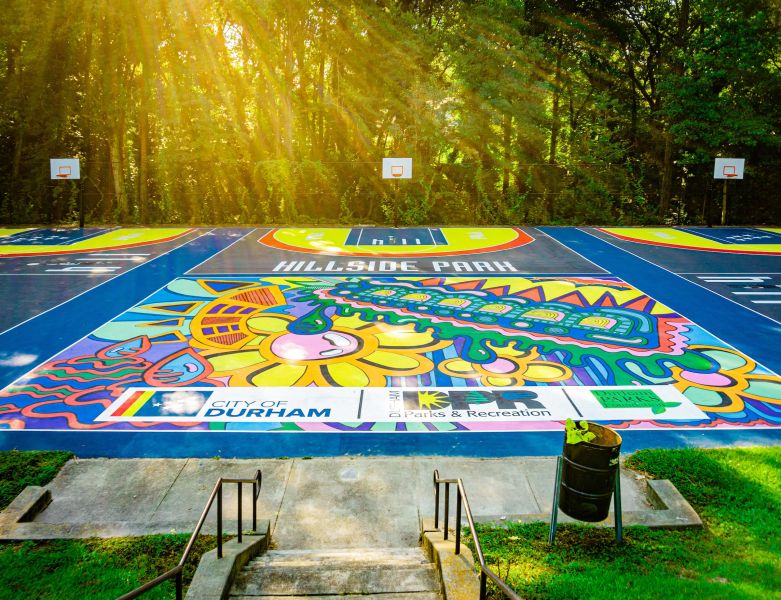
Beautiful public art at Hillside Park, funded by FILA North America and the Tamia and Grant Hill Foundation. Photo: Discover Durham
Intercollegiate Sports
Whether the energy that fills Cameron Indoor Stadium during a Duke University Blue Devils basketball game or the one-of-a-kind atmosphere of O'Kelly-Riddick Stadium as the North Carolina Central Eagles take the field, collegiate sports in Durham are a spectacle. Black athletes sprint towards victory on the track, serve notice on the tennis court and excel in other arenas wearing Duke blue or North Carolina Central maroon. Each scholar-athlete is remembered not only for their play but also for their commitment to academic achievement and athletic prowess.
Duke Basketball Museum & Athletics Hall of Fame
The history of Duke Men’s Basketball and 26 other intercollegiate sports at the university is brought to life year-round at the Duke Basketball Museum & Athletics Hall of Fame. The 6,600 square-foot space displays many title trophies, interactive videos and memorabilia as well as portraits of Hall of Fame members.
NCCU Sports Facilities
The NCCU Eagles are proudly represented by 14 intercollegiate athletics teams that compete at sports facilities across campus. NCCU currently competes in the Mid-Eastern Athletic Conference (MEAC) after competing for many years and winning 50+ conference championships in the Central Intercollegiate Athletic Association. Spectators can cheer on the Eagles as they soar at campus sports facilities.
L. T. Walker Complex
O’Kelly-Riddick Stadium
McDougald-McLendon Arena
Dr. James W. Younge Tennis Courts
HBCU National Champions
NCCU's 2022 football team defeated a Deion Sanders-coached Jackson State University in the Cricket Celebration Bowl to win the HBCU National Football Championship.

Catch the NCCU Eagles put on a show on the gridiron. Photo: Kevin L. Dorsey
John B. McLendon and The Secret Game
The South’s first interracial college basketball game was played long before the Civil Rights Movement took hold. On a Sunday morning in 1944, when most of Durham was in church, NCCU basketball coach John McLendon led his all-Black team to face the all-white Duke University medical school team, and it was played in secret behind locked doors. The Eagles won the game and left a lasting impression on white players from local teams, who came in carloads looking for pick-up games to witness the NCCU players’ skill. The groundwork was laid for integration in sports and beyond.
McLendon went on to achieve many racial firsts: he was the first Black basketball coach in the professional leagues, the first assistant U.S. Olympic basketball coach and the first coach to win a desegregated tournament at the National Association of Intercollegiate Athletics (NAIA). And that says nothing about his achievements on the court.
The Durham Black Socks
Durham is home to the Durham Bulls, a Minor League Baseball team with a rich history and passionate fan base. Yet, Durham's baseball history goes deeper: The Durham Black Sox were one of several Negro League baseball teams in Durham from the 1920s through 1963 along with the Durham Eagles and Durham Rams. The team played at El Toro Park, first built in 1926 and later renamed Durham Athletic Park (DAP), now the Historic Durham Athletic Park. The Durham Black Sox have been recognized by Major League Baseball as part of an initiative called The Nine which honors and celebrates Black pioneers through ceremonies and events at Minor League Baseball ballparks and communities.
Algonquin Tennis Club
Born out of segregation, The Algonquin Tennis Club was formed in 1922 to give aspiring African American tennis players a place to meet and play. The club, which also became a social club, was a meeting place for African-American business leaders, educators and politicians. As part of The American Tennis Association, the nation’s first professional sports league for African Americans, The Algonquin Tennis Club hosted tournaments and exhibitions for Black athletes, among them Althea Gibson and Arthur Ashe.
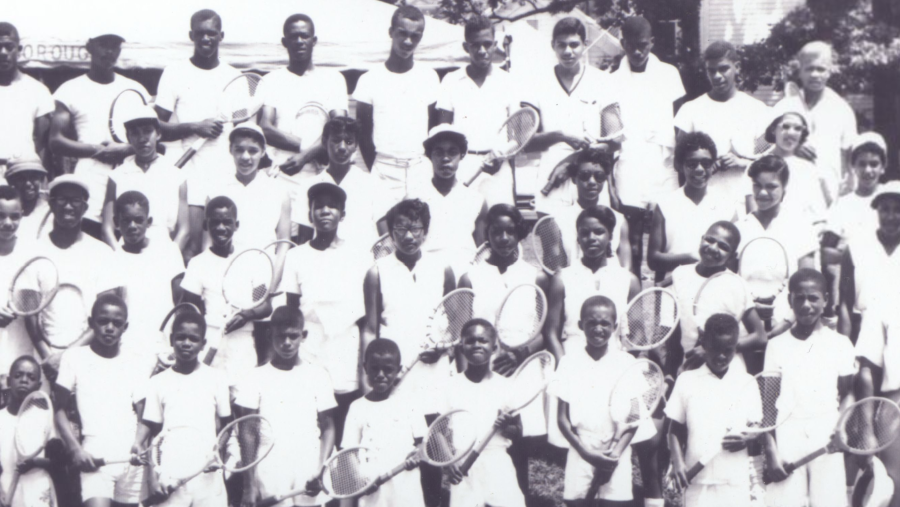
The Algonquin Tennis club was a crucial establishment for African Americans both near to and far from Durham. Photo: Durham County Library Historical Photo Collection
In Durham, the tradition of sports excellence transcends boundaries and unites communities. The story of Durham’s Black athletes is one of perseverance in the pursuit of greatness and the power of sports to unite communities and ignite passions.
more stories from the African American Heritage Guide
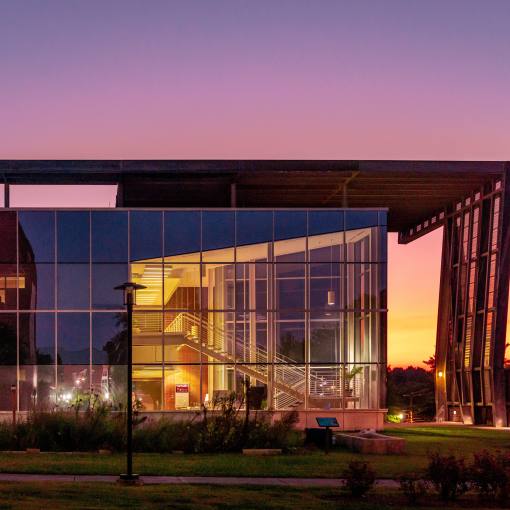
North Carolina Central University: No Ordinary, Common Barnyard Fowl “That audacious belief of our people – that in most ordinary men and women there reside the most extraordinary possibilities, and that, if we keep the doors of opportunity open to them, they will amaze us with their achievements.” Dr. James E. Shepard Learn More
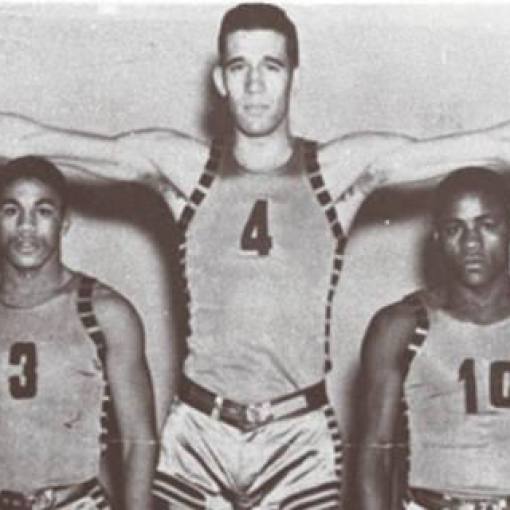
Brave Buckets: Durham's Secret Game Learn about the first interracial basketball game in the Jim Crow South in this WUNC feature about North Carolina Central University's John McLendon. Learn More
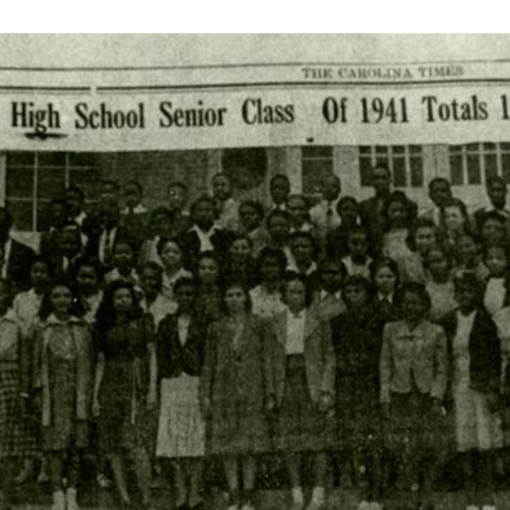
Hillside High School The proud history and storied legacy of Hillside High School. Learn More
